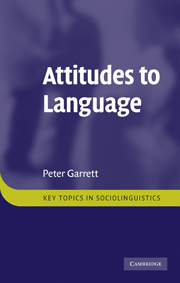Book contents
- Frontmatter
- Contents
- List of figures
- List of tables
- Acknowledgements
- 1 Introduction
- 2 Fundamentals of language attitudes
- 3 Main approaches to the study of language attitudes
- 4 Matched and verbal guise studies: focus on English
- 5 Matched and verbal guise research in more contexts
- 6 Attitudes to speech styles and other variables: communication features, speakers, hearers and contexts
- 7 Communication accommodation theory
- 8 Language attitudes in professional contexts
- 9 Societal treatment studies
- 10 Direct approach
- 11 Folklinguistics
- 12 An integrated programme of language attitudes research
- 13 Conclusion
- Glossary
- References
- Index
- References
11 - Folklinguistics
Published online by Cambridge University Press: 05 June 2012
- Frontmatter
- Contents
- List of figures
- List of tables
- Acknowledgements
- 1 Introduction
- 2 Fundamentals of language attitudes
- 3 Main approaches to the study of language attitudes
- 4 Matched and verbal guise studies: focus on English
- 5 Matched and verbal guise research in more contexts
- 6 Attitudes to speech styles and other variables: communication features, speakers, hearers and contexts
- 7 Communication accommodation theory
- 8 Language attitudes in professional contexts
- 9 Societal treatment studies
- 10 Direct approach
- 11 Folklinguistics
- 12 An integrated programme of language attitudes research
- 13 Conclusion
- Glossary
- References
- Index
- References
Summary
Folklinguistics underlies another direct approach to language attitudes research. The term is not used here to suggest that the data in such studies is impoverished, although, as Niedzielski and Preston (2000: 3) have noted, it has certainly received such criticism. Rather, the term is used simply to refer to the views and perceptions of those who are not formally trained experts in the area being investigated – here, perhaps, ‘non-linguists’. The approach attracted increasing attention through the 1990s and is particularly identified with Dennis Preston (e.g.1989; 1993; 1996; 1999). Referring to the limitations of traditional dialectology in particular, Preston (1999) points to Hoenigswald's (1966: 20) claim that ‘we should be interested not only in what goes on (in language) but also in how people react to what goes on, and in what people say goes on (talk about language)’. Apart from re-stating the view of Labov that the evaluative side of language is pivotal to the understanding of language variation and change, it also underlines the importance of language attitudes in metalanguage generally (Jaworski, Coupland and Galasiński 2004).
One could argue, of course, that most language attitudes work tries to access the attitudes of ‘ordinary people’, or the ‘folk’. Against that, Preston argues that, despite the contribution that language attitudes work has made to our understanding of a speech community's set of beliefs about language and language use, much of it has nevertheless been too limited in scope, making it hard to interpret at times.
- Type
- Chapter
- Information
- Attitudes to Language , pp. 179 - 200Publisher: Cambridge University PressPrint publication year: 2010

